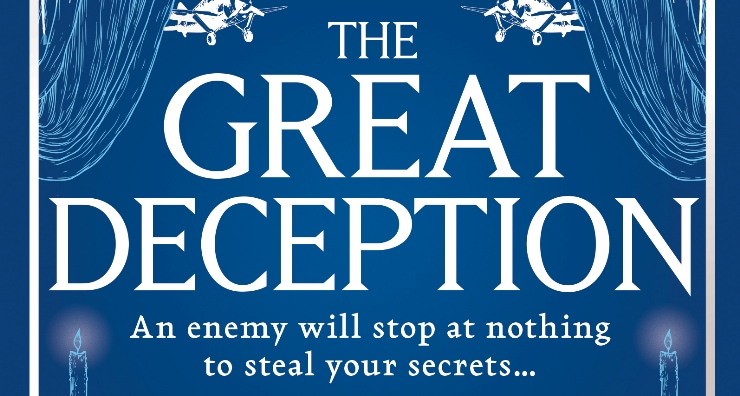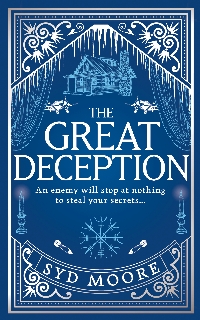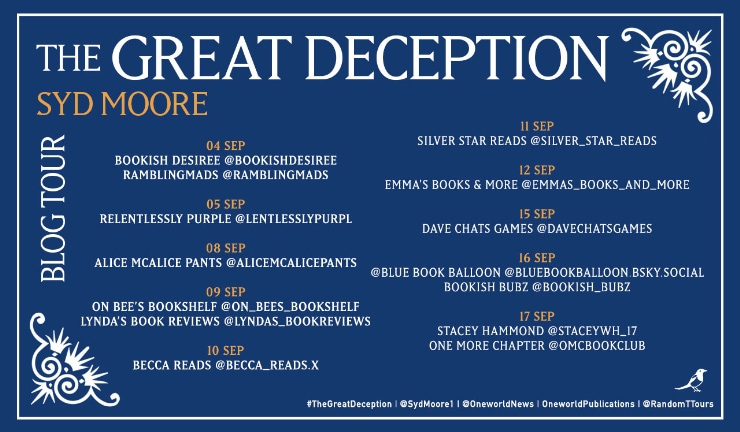Blog tour: The Great Deception by Syd Moore

This post is part of a blog tour organised by Random Things Blog Tours. I received a free copy of the book in return for an honest review.
‘May 1940. As the Nazis overrun Denmark, Britain counters by invading Iceland.
‘Secret agent Daphne Devine is dropped into occupied territory to assess a clairvoyant in Reykjavik, who may be passing information to the enemy. Alone, she must navigate her way through this strange, frozen landscape, where the Allies aren’t always welcomed with open arms.
‘When a new lead takes her north into Strandir, the land of sorcerers, Daphne encounters fresh peril and discovers that now she, the hunter, has become the hunted. She must use all her Secret Service training to outwit the enemy agents in her midst.’

In The Great Deception, Syd Moore’s follow-up to The Grand Illusion, we’re reunited with magician’s-assistant-turned-war-spy Daphne Devine as she goes undercover in Iceland. Her mission: to investigate a stage clairvoyant who may be betraying his country, and retrieve a powerful grimoire before the Nazis get their hands on it.
As you’d expect, Daphne – still emotionally recovering from the events of the previous book – faces danger at every turn, whether that’s from hostile humans, the country’s unforgiving landscape, or even mystical forces that are bigger than both. Journeying into the wintery wilderness with her local contacts, can she keep the show on the road and achieve her objective?
When I reviewed The Grand Illusion, I described it as ‘fascinating’ and ‘exciting’. Exactly the same words came to mind as I read The Great Deception, and why find synonyms when the appropriate words are right there?
Having recently got a small taste of Iceland’s Second World War experience in Eva Björg Ægisdóttir’s Home Before Dark, I seized the chance to learn more about it. When Daphne arrives in 1940, the country has just been occupied by British and Canadian soldiers – a situation most, but not all, Icelanders find preferable to the alternative.
Hence, Daphne’s orders to look into Sindri Karlsson, a psychic suspected of being a Nazi sympathiser. In the guise of a journalist for The Times, Daphne – alongside her Icelandic contact, real journalist Anna Tómasdóttir – attends one of Karlsson’s shows, as well as a private séance.
On the surface, at least, Karlsson seems like the real deal, but because of her background, Daphne knows about cold reading and the arts of distraction and illusion, and (I found the way this was done so, so clever) she and Anna formulate a theory that he’s using his shows to pass traitorous messages to those who know where to look.
Even so, the possibility of the supernatural isn’t completely banished. Strange happenings at the show and séance, an alarmingly accurate vision, and even a sighting of a ghost aren’t entirely explained away by sleight of hand, lucky guesses, or a self-fulfilling prophecy.
And then there’s the grimoire that’s everyone’s focus, which is triply powerful in that it contains spells, is an enchanted object in and of itself (a magical book is literary catnip for me!), and is something Hitler is desperate to possess. Its present guardians absolutely believe in it, while Daphne and Anna concur that they don’t not believe in the supernatural.
Of course, Iceland’s early nights, Northern Lights, and unpredictable weather conditions and tectonic movements bolster the eerie atmosphere, transporting me to a place that’s so otherworldly in its stark beauty, anything could happen.
Daphne continues to be an appealing, sympathetic character who’s, refreshingly, no gung-ho war hero. She’s highly conscientious and cautious, often worrying that she’s not the right person for the job (her principal motivation is getting her Italian mother freed from an internment camp on the Isle of Wight), that she’ll accidentally blow her cover, or that she’ll have to resort to violence. She’s also highly resourceful, drawing on her stage skills when required, and struggles to be taken seriously by the men in charge, even though they deployed her for a reason.
Through Daphne, and more generally, The Great Deception never loses sight of the tragedy of war. As mentioned, Daphne is still mentally scarred by her experiences in The Grand Illusion, and anxious for her loved ones. Many of the people she meets have lost someone in the present or previous war, some bearing it stoically and others, like a woman she meets at the séance, becoming catatonic with grief. As Moore points out, with so much loss affecting everyone, it’s logical that psychic mediums were so popular during this period.
The Great Deception is fascinating, exciting – and more than a little eerie.
